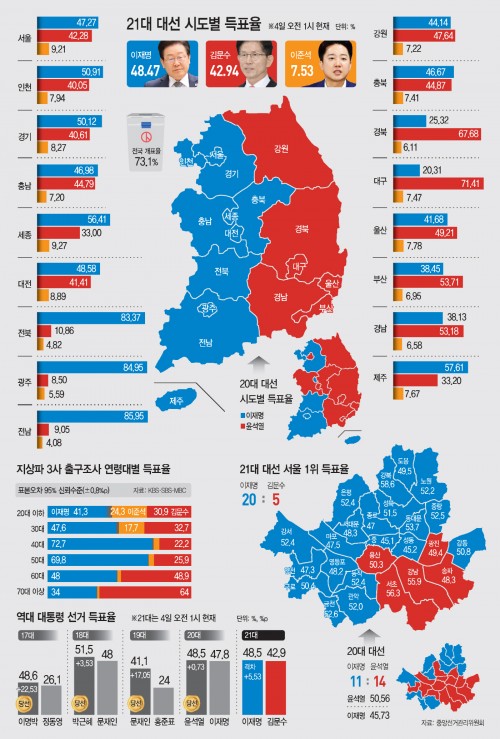 |
President-elect Lee Jae-myung, officially confirmed as the 21st president of South Korea on June 4, plans to make addressing the country’s economic challenges his top priority. In his first policy directive, President Lee is set to focus on reviving the livelihoods of ordinary citizens and stabilizing the economy, amid a range of broader reforms.
Lee has pledged to expand AI funding and secure 50,000 high-performance GPUs to launch an open-access AI project. He also aims to develop an "energy superhighway" along the west coast by 2030 and across the Korean Peninsula by 2040, establish RE100 industrial complexes, and boost green energy pensions to revitalize declining regions.
He plans to introduce a “one-strike-out” rule for stock manipulation, strengthen shareholder protections, and enhance minority shareholder rights through cumulative voting.
To promote balanced national development, Lee will push for timely construction of the National Assembly’s Sejong office and a presidential office in Sejong, while advancing a second round of public institution relocations. He also supports special development laws for five mega-regions and three autonomous provinces, along with democratic oversight of emergency powers to prevent abuse.
Lee’s welfare agenda includes expanding child benefits, extending parental leave to all employed parents, broadening eligibility and payment levels for earned income and child tax credits, reducing essential living costs for workers, enhancing public childcare systems, easing caregiving costs, expanding integrated nursing care wards, and strengthening disability care services.
Healthcare reforms include establishing a public medical school, adjusting medical school enrollment quotas, promoting public engagement in healthcare reform, and piloting a community-based primary care program in underserved areas.
Lee plans to gradually implement a 4.5-day workweek, extend the retirement age, ban discriminatory platform brokerage fees, and strengthen local governments’ labor inspection powers.
Proposals include new measures for COVID-related loan relief, comprehensive support for reducing business burdens, and expanding industrial accident insurance and paid sick leave.
Lee will increase funding for regional national universities, promote a shift from undergraduate-focused to graduate-level research universities, ease income-based conditions for student loan repayments, enhance democracy education for students and teachers, improve conditions for scientists and researchers, and strengthen teacher protections.
He is committed to accelerating greenhouse gas reductions, transitioning to renewable energy, phasing out coal by 2040, developing a national roadmap to reduce plastic use, promoting bioplastics, cooperating with neighboring countries to combat fine dust pollution, expanding electric vehicle adoption, and increasing biodiversity protection zones.
Plans include expanding eco-friendly organic farming, improving income security for farmers, ensuring fair rice prices, promoting solar energy for farms, supporting income growth for fishers, and increasing subsidies for young fishermen.
The Democratic Party, under Lee’s leadership, proposes public involvement in selecting the National Human Rights Commission chair, mandatory external appointments for internal inspectors at the Board of Audit and Inspection, and major judicial reforms—separating prosecutorial powers, enhancing oversight of prosecutorial discretion, and introducing new disciplinary measures for prosecutors.
Judicial reforms also include expanding online trials, increasing the number of Supreme Court justices to ensure faster trials, broadening citizen participation in trials, and enhancing public access to court decisions. In financial policy, Lee supports tougher penalties for financial crimes and stronger data security requirements.
The party aims to legally ban blanket wage systems, introduce transparent wage structures, and strengthen health and safety protections for subcontracted workers.
To address low birth rates and aging, the government will increase credit card tax deductions based on number of children, expand tax credits for extracurricular education expenses for elementary students, establish a “Our Kids Independence Fund,” enhance support for newlyweds, expand infertility treatment coverage, increase public housing for newlyweds, and broaden after-school care for elementary students.
The administration also plans 24-hour care services for people with developmental disabilities, launch a public trust system for elderly asset management, and implement integrated community-based healthcare and caregiving services for seniors. Retirement age extensions aligned with pension eligibility will be pursued through national consensus.
Most Read
-
1
-
2
-
3
-
4
-
5
-
6
-
7





















